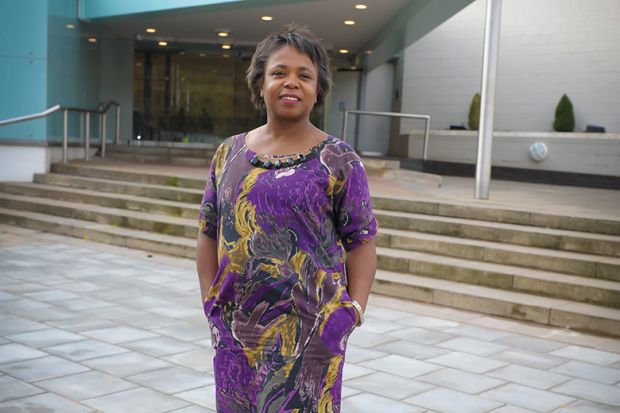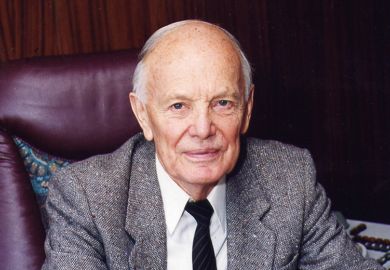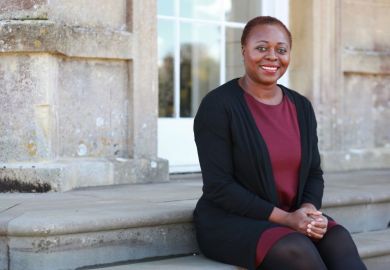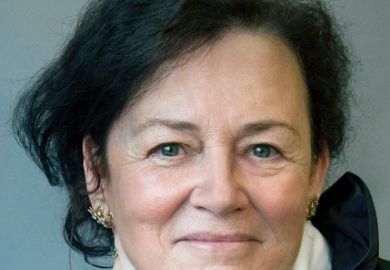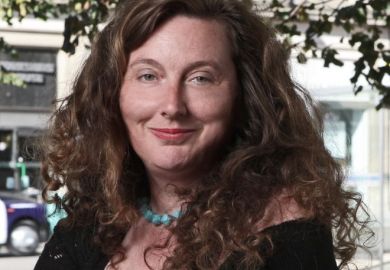In September, Doreen Foster took over as director of the University of Warwick’s Warwick Arts Centre – one of the UK’s largest arts venues outside London, with a programme of theatre, dance, music, visual arts and family events. She was previously deputy director of the Black Cultural Archives, based in Brixton, south London, and chief executive of the Bernie Grant Arts Centre. The Warwick Arts Centre is undergoing a £17.5 million redevelopment, creating three new digital auditoriums that will serve as cinemas and host live performances, and will help support Coventry in its preparations to be UK City of Culture in 2021.
Where and when were you born?
I was born in 1964 in Smethwick, Sandwell [in the West Midlands].
How has this shaped who you are?
I didn’t realise it at the time, but I have since understood how lucky I was to have gone to a primary school [Bearwood Primary School in Smethwick] with a black headteacher, Mr [Tony] O’Connor, and two other teachers of colour. Mr O’Connor and Mrs Jackson – my favourite teacher – created a welcoming environment that I believe had a massive impact on my confidence as a child and now as an adult. Last year, I discovered that Mr O’Connor was Britain’s first black headteacher. His appointment had caused outrage [newspaper reports from 1967 relate how racist graffiti and swastikas were daubed on the walls of the school after Mr O’Connor was chosen as head].
In terms of your time as an undergraduate, at what was then the University of Central England (now Birmingham City University), what did going to university mean for you?
I went to university as a mature student so I had a clearer understanding of the difference that a degree could make to one’s progression in the workplace. So I really valued my time at university, including my Erasmus year at the University of Valencia. All my classes were taught in Spanish so it was a really tough year for me, but it transformed my life.
What is the importance of the Black Cultural Archives, and how does the institution connect with the public?
The children and grandchildren of the Windrush generation have grown up knowing little about the history of black presence in this country. For too long, the narrative was of us as victims. The Black Cultural Archives, both through the material that it holds and its public programmes and exhibitions, corrects that story.
Tell us about where you’re living in Coventry and how living there fits with what the Arts Centre is hoping to achieve.
I live in Foleshill on a development that used to be the site of the Courtaulds factory [a former textiles and chemicals facility], which opened in 1905. Foleshill is incredibly diverse and my neighbours are from Libya, India, Bulgaria, Poland and a host of other countries. There are three gurdwaras within a five-minute walk, and shops selling every spice you will ever need. We want to open up the arts centre to new audiences and artists. Living in Foleshill, where there is no visible evidence of our reach, reminds me of the work that we need to do; but it also inspires me to explore arts and culture from other parts of the world and to think about how we can reflect those voices across our programmes.
What can Warwick Arts Centre do for the university community, and also for people living in Coventry and the wider region?
It can excite, broaden minds and tastes and introduce people to new worlds.
What role will the centre play in helping Coventry prepare to be UK City of Culture?
We will be developing our presence off-campus, stimulating greater engagement in culture in communities new to us. We’re still working out what that might look like, so watch this space.
What keeps you awake at night?
Right now, it’s excitement about the arts centre that I want us to be in the future.
Tell us about someone you admire.
Sir Nick Serota [former director of the Tate]. He was my mentor during my Clore Fellowship [a leadership development programme for the cultural and creative sectors]. I admire his quiet leadership.
What was the last book, film or play that changed the way you think?
[The play] ear for an eye by debbie tucker green.
What brings you happiness?
Lighting a spark in someone and watching them do the work that transforms their outlook and the way that they live their life. And on a lighter note, gardening. I love food and nothing beats the taste of home-grown fruit and vegetables.
john.morgan@timeshighereducation.com
Appointments
Deborah Gill, director of UCL Medical School, will be an institutional champion for the student experience as her university’s first pro vice-provost for student experience. Professor Gill will also support preparations for the subject-level teaching excellence framework and work with UCL’s student engagement team and students’ union to ensure that the university responds to course feedback. She said that she was “look[ing] forward to working with a wide range of academics, professional services and support staff, as well as student reps and the
wider student body to make UCL a great place to learn and thrive”.
Simon Redfern has been named the new dean of the College of Science at Singapore’s Nanyang Technological University. Professor Redfern, who is head of the Earth sciences department at the University of Cambridge, will take up his post at the college, which includes the Asian School of the Environment, the School of Biological Sciences and the School of Physical and Mathematical Sciences, in summer 2019. Subra Suresh, NTU’s president, said that the college was “a key part of the intellectual ecosystem of NTU in education, research, innovation and societal impact” and that Professor Redfern’s “exceptional track record, experience and expertise will be an asset” to the university.
Larry Sparks will be the interim chancellor of the University of Mississippi. The former finance chief at “Ole Miss” will take over in January following Jeffrey Vitter’s resignation.
Jeremy Nicholls has been appointed Staffordshire University’s first professor of social value and impact.
Lee Elliot Major is stepping down as chief executive of the Sutton Trust, a UK educational charity, to become professor of social mobility at the University of Exeter.
Julia Clarke, pro vice-chancellor of Manchester Metropolitan University’s Faculty of Business and Law, is the new chair of the Chartered Association of Business Schools.
Register to continue
Why register?
- Registration is free and only takes a moment
- Once registered, you can read 3 articles a month
- Sign up for our newsletter
Subscribe
Or subscribe for unlimited access to:
- Unlimited access to news, views, insights & reviews
- Digital editions
- Digital access to THE’s university and college rankings analysis
Already registered or a current subscriber?
